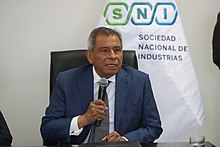
El Comercio is a Peruvian newspaper based in Lima. Founded in 1839, it is the oldest newspaper in Peru and one of the oldest Spanish-language papers in the world. It has a daily circulation of more than 120,000. It is considered a newspaper of record and one of the most influential media in Peru.
Renzo Revoredo Zuazo is a Peruvian former professional footballer who played as a right-back or centre-back. He made 17 appearances for the Peru national team.

Camaleones (Chameleons) is a 2009 Mexican telenovela produced by Rosy Ocampo for Televisa. The telenovela aired on Canal de las Estrellas from July 27, 2009 to January 29, 2010. It stars Belinda, Alfonso Herrera, Edith González and Guillermo García Cantú.

José Pedro Castillo Terrones is a Peruvian politician, former elementary school teacher, and union leader who served as the President of Peru from 28 July 2021 to 7 December 2022. Facing imminent impeachment proceedings, on 7 December 2022, Castillo attempted to illegally dissolve Congress and rule by decree. In response, the Congress of the Republic of Peru impeached him, resulting in his removal from office.

Since 2016, Peru has been plagued with political instability and a growing crisis, initially between the President, Pedro Pablo Kuczynski and Congress, led de facto by Keiko Fujimori. The crisis emerged in late 2016 and early 2017 as the polarization of Peruvian politics increased, as well as a growing schism between the executive and legislative branches of government. Fujimori and her Fujimorist supporters would use their control of Congress to obstruct the executive branch of successive governments, resulting with a period of political instability in Peru.

Ricardo Marquez Flores is a Peruvian businessman and former Fujimorist politician. He was First Vice President of Peru during the second term of Alberto Fujimori between 28 July 1995 and 28 July 2000, and later served as Second Vice President of Peru during Fujimori's brief third term from 28 July 2000, until the resignation of Fujimori on 21 November 2000. He served as the president of the National Society of Industries (SNI) on two occasions, from 1993 to 1994 and from 2018 to 2022.

Francisco Rafael Sagasti Hochhausler is a Peruvian engineer, academic, politician, and author who served as the President of Peru from November 2020 to July 2021.

Popular Renewal is a Peruvian conservative political party. Founded in 2020, the party is the successor of the former National Solidarity Party founded and led by former Lima Mayor Luis Castañeda Lossio. Following its poor results at the 2020 snap parliamentary election, leader Rafael López Aliaga announced the party's re-foundation under the Popular Renewal.

Luis Alberto Otárola Peñaranda is a Peruvian attorney and politician who was the Prime Minister of Peru from 2022 until his resignation in 2024. He previously served as Minister of Defense twice, under Ollanta Humala and Dina Boluarte.

Dina Ercilia Boluarte Zegarra is a Peruvian politician, civil servant, and lawyer who has been serving as the 64th and current president of Peru since 2022. She had served as the first vice president and minister at the Ministry of Development and Social Inclusion under President Pedro Castillo. She served as an officer at the National Registry of Identification and Civil Status (RENIEC) from 2007 until 2022.

The presidency of Pedro Castillo began with his inauguration as the president of Peru on 28 July 2021, the Peruvian Independence Day. In the 2021 Peruvian general election, Castillo, a school teacher and union organizer, won the presidential election against the right-wing candidate Keiko Fujimori of Popular Force by a 45,000 margin in the runoff. In the congressional elections, Castillo's party, Free Peru, did not get a majority in the Congress of the Republic of Peru.

Mass protests in Peru against inflation and President Pedro Castillo's government began in March 2022. The protests occurred amid rising fertilizer and fuel prices caused by Russia's invasion of Ukraine and international sanctions imposed on Russia. Some of the larger protests were organized by Geovani Rafael Diez Villegas, the leader of the Union of Multimodal Transport Guilds of Peru (UGTRANM) who had previously collaborated in late 2021 with business executives and right-wing politicians, opposing the Castillo government and whose power is recognized as rivaling the government's own Ministry of Transport and Communications. Diez Villegas demanded the removal of passenger restrictions on buses, pardons for transportation workers who were charged with crimes, and negotiations for forgiving debt owed by transportation businessmen to the government. He later organized a general strike aimed at paralysing transportation in Peru beginning on 4 April 2022 that resulted in protests, product shortages, transportation stoppages and rioting.

Vanya Melissa Thais Iriarte is a conservative Peruvian political commentator. She gained prominence in Peruvian media for her strong opposition to Pedro Castillo during the 2021 Peruvian general election and her frequent controversial statements in the press.

On 7 December 2022, Pedro Castillo, the then-President of Peru, made an attempt to dissolve the Congress amidst looming removal proceedings. This move included the immediate imposition of a curfew, an attempt to establish an emergency government, and a call for the formation of a constituent assembly. Prior to this, Attorney General Patricia Benavides had accused Castillo of leading a criminal organization, a claim that contravened Article 117 of the Constitution of Peru. She had urged the Congress to remove him from office, leading to the third removal attempt against Castillo. Castillo defended his actions by arguing that the Congress, which had obstructed many of his policies, was serving oligopolistic businesses and had colluded with the Constitutional Court to undermine the executive branch, thereby creating a "congressional dictatorship". He also advocated for the immediate election of a constituent assembly, a demand that had been echoed since the 2020 Peruvian protests.

Following the ousting of president of Peru, Pedro Castillo on 7 December 2022, a series of political protests against the government of president Dina Boluarte and the Congress of Peru occurred. The demonstrations lack centralized leadership and originated primarily among grassroots movements and social organizations on the left to far-left, as well as indigenous communities, who feel politically disenfranchised. Castillo was removed from office and arrested after announcing the illegal dissolution of Congress, the intervention of the state apparatus, and the forced establishment of an "emergency government", which was characterized as a self-coup attempt by all government institutions, all professional institutions, and mainstream media in Peru while Castillo's supporters said that Congress attempted to overthrow Castillo. Castillo's successor Dina Boluarte, along with Congress, were widely disapproved, with the two receiving the lowest approval ratings among public offices in the Americas. Among the main demands of the demonstrators are the dissolution of Congress, the resignation of Boluarte, new general elections, the release of Castillo, and the formation of a constituent assembly to draft a new constitution. It has also been reported that some of the protesters have declared an insurgency in Punos's region. Analysts, businesses, and voters said that immediate elections are necessary to prevent future unrest, although many establishment political parties have little public support.

The 2022–2023 Apurímac protests corresponds to a series of protests and violent confrontations that began on 10 December 2022 in the department of Apurímac in the context of the December 2022 Peruvian protests. The protesters demand the resignation of President Dina Boluarte, the closure of the Congress of the Republic, and new general elections. Unlike the protests in other regions and cities, in Apurímac the confrontations are more violent, and criminal acts have been recorded, such as the kidnapping of police officers and attacks on police stations. The Boluarte government declared a state of emergency, removing some constitutional protections from citizens, including the rights preventing troops from staying within private homes and buildings, freedom of movement, freedom of assembly and "personal freedom and security".

The third presidential vacancy (impeachment) process against President Pedro Castillo was an action initiated by the Congress of the Republic of Peru with the purpose of declaring the "permanent moral incapacity" of the President of the Republic, Pedro Castillo, under Article 113 of the Political Constitution of Peru.

The Ayacucho massacre was a massacre perpetrated by the Peruvian Army on 15 December 2022 in Ayacucho, Peru during the 2022–2023 Peruvian protests, occurring one day after President Dina Boluarte, with the support of right-wing parties in Congress, granted the Peruvian Armed Forces expanded powers and the ability to respond to demonstrations. The clash occurred due to the protesters' attempt to storm the local airport. On that day, demonstrations took place in Ayacucho and the situation intensified when the military deployed helicopters to fire at protesters, who later tried to take over the city's airport, which was defended by the Peruvian Army and the National Police of Peru. Troops responded by firing live ammunition at protesters, resulting in ten dead and 61 injured. Among the injured, 90% had gunshot wounds, while those killed were shot in the head or torso. Nine of the ten killed had wounds consistent with the ammunition used in the IMI Galil service rifle used by the army.

The Juliaca massacre occurred on January 9, 2023, in the city of Juliaca, located in Peru’s Puno Department, amid widespread protests against President Dina Boluarte's government. The event marked one of the deadliest confrontations during the 2022–2023 Peruvian political protests, which erupted following the ousting and imprisonment of former president Pedro Castillo. Peruvian National Police opened fire on demonstrators, who were primarily from the Aymara and Quechua Indigenous communities, resulting in the deaths of at least 18 civilians, including a medical worker, and injuries to over 100 individuals. Most fatalities were caused by gunshot wounds, with reports indicating the use of military-grade weapons by police, sparking widespread condemnation.
This is a broad timeline of the 2022–2023 Peruvian protests against the government of Dina Boluarte and the Congress of Peru, sparked by the self-coup attempt of President Pedro Castillo, who was later arrested for his actions. The protests were organized by social organizations and indigenous peoples who felt they experienced political disenfranchisement, specifically on the politically left-wing to far left, with the groups demanding immediate general elections and a constituent assembly to draft a new Constitution of Peru.
















